
Lyle Pearce Lovett is an American country singer, songwriter, actor and record producer. Active since 1980, he has recorded 13 albums and released 25 singles to date, including his highest entry, the number 10 chart hit on the U.S. Billboard Hot Country Songs chart, "Cowboy Man". Lovett has won four Grammy Awards, including Best Male Country Vocal Performance and Best Country Album. His most recent album is 12th of June, released in 2022.

William Dale Fries Jr. was an American commercial artist who won several Clio Awards for his advertising campaigns. He was also a musician and is best known for his character C. W. McCall, a truck-driving country singer that he originally created for a series of bread commercials. Fries performed as McCall in a series of outlaw albums and songs in the 1970s, in collaboration with co-worker Chip Davis who also founded Mannheim Steamroller.
Louis F. "Chip" Davis Jr. is the founder and leader of the music group Mannheim Steamroller. Davis composed the music for several C. W. McCall albums, including the hit 1975 song "Convoy". He has also written and made other albums, such as Day Parts, and has written several books.
Mannheim Steamroller is an American neoclassical new-age music ensemble founded and directed by percussionist/composer Chip Davis in 1974. The group is known primarily for its Fresh Aire series of albums, which blend classical music with elements of new age and rock, and for its modern recordings of Christmas music. The group has sold 28 million albums in the U.S. alone.

Brooks & Dunn are an American country music duo consisting of Kix Brooks and Ronnie Dunn, both of whom are vocalists and songwriters. The duo was founded in 1990 through the suggestion of songwriter and record producer Tim DuBois. Before their formation, both members were solo recording artists, having charted two solo singles apiece in the 1980s. Brooks also released an album for Capitol Records in 1989 and wrote hit singles for other artists.
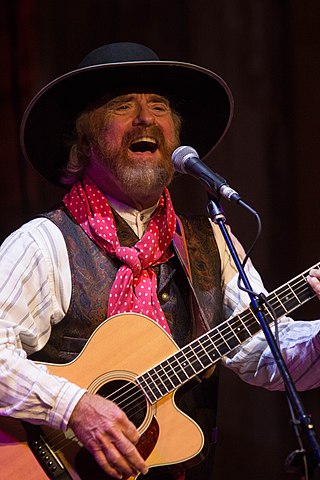
Michael Martin Murphey is an American singer-songwriter. He was one of the founding artists of progressive country. A multiple Grammy nominee, Murphey has six gold albums, including Cowboy Songs, the first album of cowboy music to achieve gold status since Gunfighter Ballads and Trail Songs by Marty Robbins in 1959. He has recorded the hit singles "Wildfire", "Carolina in the Pines", "What's Forever For", "A Long Line of Love", "What She Wants", "Don't Count the Rainy Days", and "Maybe This Time". Murphey is also the author of New Mexico's state ballad, "The Land of Enchantment". Murphey has become a prominent musical voice for the Western horseman, rancher, and cowboy.
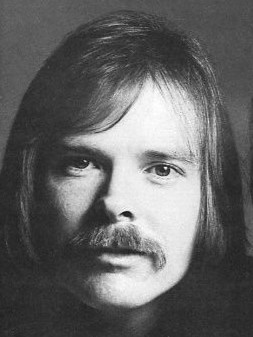
Danny Wayland Seals was an American musician. The younger brother of Seals and Crofts member Jim Seals, he first gained fame as one half of the soft rock duo England Dan & John Ford Coley, who charted nine singles between 1976 and 1980, including the No. 2 Billboard Hot 100 hit "I'd Really Love to See You Tonight".
This is a list of notable events in country music that took place in the year 1975.

Wolf Creek Pass is the debut album by country musician C. W. McCall, released in 1975 on MGM Records. It was recorded after the success of a song included in the album, "Old Home Filler-up an' Keep on a-Truckin' Cafe", which was used in a popular television commercial that helped make McCall famous. McCall himself was the pseudonym of Bill Fries and was convened by Fries along with Chip Davis of Mannheim Steamroller fame. The album concentrated predominantly on themes related to trucking, with many of them based on events in Fries' life. The album also contained the eponymous song "Wolf Creek Pass", which helped popularize the actual mountain pass itself. The actual "Old Home Filler-up an' Keep on a-Truckin' Cafe" was located in Pisgah, Iowa.

Black Bear Road is an album by country musician C. W. McCall, released on MGM Records in 1975. It is largely considered the album which gave him the most significant boost of his career, almost entirely due to the hit novelty song, "Convoy", that hit the number one spot on both Billboard's Country charts and its Pop charts. The song itself was largely responsible for starting a nationwide citizens' band radio craze. The song "Black Bear Road" in turn popularized the now-infamous road itself, along with its "You don't HAVE to be crazy to drive this road - but it helps" sign.
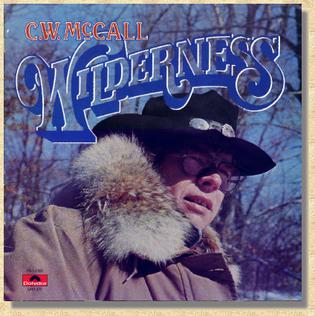
Wilderness is an album by country musician C. W. McCall, a pseudonym of singer and advertising executive Bill Fries, released on Polydor Records in 1976. As its title suggests, it focuses on subjects connected with nature, the environment and humans' impact on them. "There Won't Be No Country Music ", for example, is a statement on the environment's bleak-looking future and the effects of over-commercialization bordering on propaganda. "Crispy Critters", on the other hand, is the humorous telling of a true tale involving a group of hippies riding into a town and being forced away and threatened by the mayor.
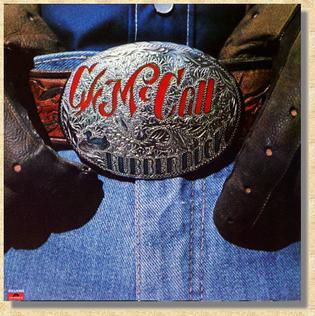
Rubber Duck is an album by country musician C. W. McCall, released on Polydor Records in 1976. It is his fourth album, released the same year as Wilderness, but concentrating on the themes the McCall character was popular for – trucking, as opposed to the various depictions of nature that could be found in Wilderness. Among others, the album contains the song "'Round the World with the Rubber Duck", a sequel to McCall's earlier wildly popular hit "Convoy", with many humorous and absurd elements added. "Audubon" is a quasi-autobiographical song, while "Ratchetjaw" is a take on trucker slang, with a multitude of CB-related terminology included in the lyrics.
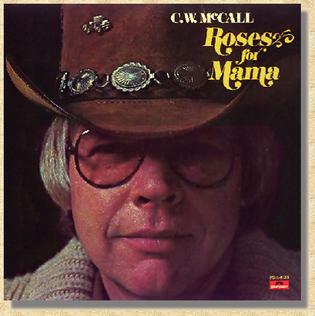
Roses for Mama is the fifth album by country musician C. W. McCall, released on Polydor Records in 1977. The album saw McCall singing several songs that were written by others, as opposed to his previous albums, which were written entirely by himself and Chip Davis. In fact, only three songs were written by the McCall and Davis; these are "I Don't Know ", "The Gallopin' Goose" and "Old Glory". "The Battle of New Orleans" is a cover version of Johnny Horton's popular 1959 song.

The Real McCall: An American Storyteller is an album by country musician C. W. McCall, released on American Gramaphone in 1990 and rereleased in 1999. It features revamped digital versions of some of McCall's better known songs, including "Convoy", "Wolf Creek Pass" and "Black Bear Road", rerecorded by the artist for the album. It contains more songs than any other release by the artist, with sixteen tracks in total. It features songs from most of McCall's albums, the exceptions being his later works, C. W. McCall & Co. and Roses for Mama. One new track, "Comin' Back for More", telling the story of the infamous American cannibal Alferd Packer, was recorded for the album and serves as its opener. Songwriting on the album is credited to lyricist Bill Fries and composer Chip Davis, who together have created nearly all original songs by McCall throughout the history of the character.

American Spirit is an album released on American Gramaphone in 2003 as a collaboration between Mannheim Steamroller and country musician C. W. McCall. The album focuses on American patriotic songs, hence the title. McCall contributed to a number of spoken word songs on the album and rerecorded his 1976 hit song "Convoy" for it; this was also the case with another song of his, "Wolf Creek Pass," which can be found on the album. McCall is a persona created by Bill Fries and Manheim Steamroller leader Chip Davis; Fries provides the vocals as McCall. This was the last album to feature C. W. McCall.
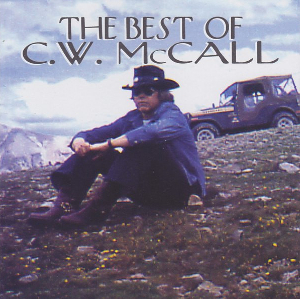
The Best of C. W. McCall is a greatest hits album released by country musician C. W. McCall on the PSM label in 1997. As with all "best of" releases from McCall, the album contains the wildly popular song "Convoy", as well as eleven others. The cover is almost identical to that of McCall's second album, Black Bear Road.

The Legendary C. W. McCall is a greatest hits album released on audio cassette only by country musician C. W. McCall in 1991, on the PolyGram label. It does not contain any songs that cannot be found on the most well-known "best of" releases from McCall, The Best of C. W. McCall and C. W. McCall's Greatest Hits. Several errors were made in the track listing; for instance, "Black Bear Road" was listed as "Black Beer Road", while "Crispy Critters" was given the title "Crispy Critter".

C. W. McCall & Co. is country musician C. W. McCall's sixth and last album of original songs, released on Polydor Records in 1979, before McCall announced his retirement from the music industry. Out of the ten tracks, only one was written as a collaboration between McCall and Chip Davis, Fries's songwriting partner, while one other, "Silver Cloud Breakdown", was composed by Davis several years earlier and was featured in the movie Convoy, though it was not present on its soundtrack.

This Time Around is the fourth studio album by Canadian country music singer Paul Brandt, released on Orange Music Canada, a subsidiary of Universal Music Group, in 2004. The record features a guest appearance by Keith Urban, who plays guitar on "Leavin'." This song was later released by Blaine Larsen in 2010. The album also features a remake of the C. W. McCall song "Convoy". It was recorded at The Orchard Studio near Nashville, TN and produced by Steve Rosen and Paul Brandt.
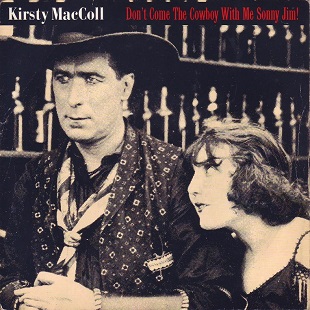
"Don't Come the Cowboy with Me Sonny Jim!" is a song by British singer and songwriter Kirsty MacColl, which was released in 1990 as the fourth and final single from her second studio album Kite. It was written by MacColl and produced by Steve Lillywhite. The song reached No. 82 in the UK and remained in the charts for four weeks. A music video was filmed to promote the single, directed by Sarah Tuft.

















